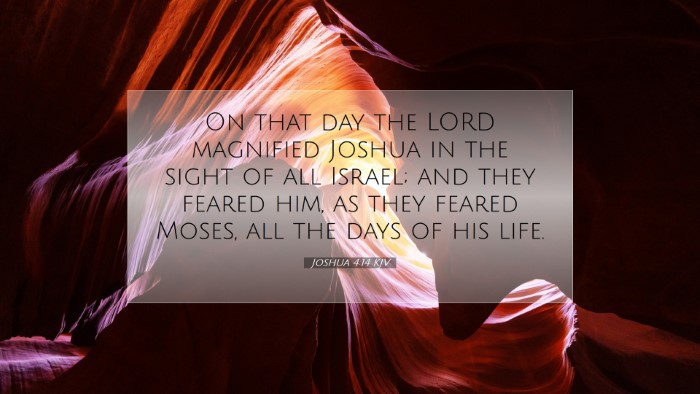Old Testament
Genesis Exodus Leviticus Numbers Deuteronomy Joshua Judges Ruth 1 Samuel 2 Samuel 1 Kings 2 Kings 1 Chronicles 2 Chronicles Ezra Nehemiah Esther Job Psalms Proverbs Ecclesiastes Song of Solomon Isaiah Jeremiah Lamentations Ezekiel Daniel Hosea Joel Amos Obadiah Jonah Micah Nahum Habakkuk Zephaniah Haggai Zechariah MalachiJoshua 4:14
Joshua 4:14 KJV
On that day the LORD magnified Joshua in the sight of all Israel; and they feared him, as they feared Moses, all the days of his life.
Joshua 4:14 Bible Commentary
Commentary on Joshua 4:14
Verse Reference: Joshua 4:14 - "On that day the Lord exalted Joshua in the sight of all Israel, and they feared him, as they had feared Moses, all the days of his life."
Introduction
Joshua 4:14 marks a pivotal moment in the leadership transition from Moses to Joshua. This verse encapsulates not just the elevation of Joshua before the people but also reflects the reverence that Israel held for God’s chosen leaders. In examining this verse, insights from both historical context and theological principles contribute to a deeper understanding of Joshua’s role and significance in biblical history.
Contextual Background
The backdrop of this verse is the miraculous crossing of the Jordan River, which occurred as the Israelites entered the Promised Land. The event itself is laden with theological import, marking the fulfillment of God's promises. The Lord's miraculous intervention in allowing the Israelites to cross on dry ground serves as a testament to His faithfulness. It is within this setting that Joshua's leadership is firmly established.
Leadership Transition
Matthew Henry comments on the theme of leadership in this passage. He describes the significance of Joshua’s exaltation as a divine endorsement, similar to how God had validated Moses before Israel. This transition is essential for spiritual continuity, and it underscores God’s providential guidance in raising leaders to accomplish His purposes.
Theological Implications
This verse raises profound theological questions concerning authority, reverence, and God’s choice of leaders. By exalting Joshua, God confirms to the people that Joshua is His appointed leader. The fear and respect shown towards Joshua, akin to that shown to Moses, emphasizes the principle that reverence towards leadership must align with reverence towards God Himself.
God's Sovereignty in Leadership
Albert Barnes highlights that God's selection of Joshua serves as a reminder of His sovereignty in appointing leaders. This acknowledgment by the Israelites is an essential aspect of their covenantal relationship with God. Understanding divine leadership is critical for both contemporary church leaders and congregations alike as it shapes the dynamics of authority and respect within the faith community.
The Nature of Reverence
Adam Clarke draws attention to the nature of reverence described in this verse. The fear exhibited by the Israelites was not merely a fear of punishment but a profound respect and awe for God’s work in and through Joshua. This serves as a model for how leaders should inspire reverence today—by reflecting God’s character and acting under His authority.
Practical Applications
As we reflect on Joshua 4:14, several practical applications emerge, particularly for pastors, scholars, and students of the Bible.
- Understanding Leadership Roles: It is vital for church leaders to recognize the authority they hold is derived from God. Leaders should seek to lead with humility and a reliance on divine wisdom.
- Encouraging Respect within the Community: The fear that the Israelites felt towards Joshua can translate into the respect that congregations owe to their spiritual leaders today. This does not promote authoritarianism but rather encourages a culture of honor and accountability.
- Building Faith in God's Guidance: The transition of leadership calls believers to trust in God’s guidance. Just as He was with Joshua, He is with current leaders and will continue to lead His people through chosen servants.
- Reflecting on the Nature of God's Work: The miraculous events surrounding Joshua’s leadership encourage believers to reflect on how God is actively working in their lives and communities, reinforcing faith and obedience.
Conclusion
Joshua 4:14 is a verse rich with implications for understanding leadership, reverence, and the divine orchestration of events in the life of Israel. It serves not only as a historical record but also as a theological lesson that remains pertinent to the church today. As we study this verse, we find encouragement to uphold and respect the appointed leaders among us, while also committing to direct our reverence ultimately towards God, who is sovereign over all.


